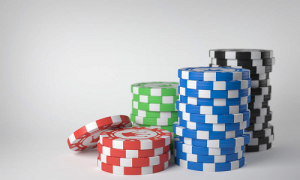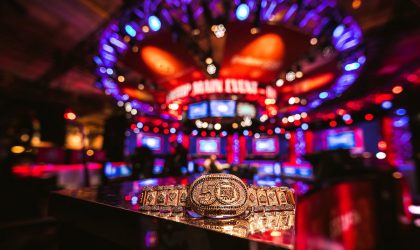Ok, Fine. I’ll Talk About the Dario Sammartino Dealer Miscount Hubbub at the WSOP.
This week, as the final table of the 2019 World Series of Poker Main Event played out, my Google news feed kept churning out headlines about a controversy involving eventual runner-up Dario Sammartino and some incorrectly counted chips when there were eleven players remaining. It was discussed briefly on ESPN, but I will admit that I largely ignored it. I mean, who cared, right? It was over and the two players involved had made the final table. Well, after some prodding, I guess I should write something about it in case some of you don’t know what happened.*
 As mentioned, this was the day before the final table of the WSOP Main Event and there were eleven players remaining in the tournament. Sammartino was at a six-handed table and raised to 1.7 million chips with pocket tens (blinds were 400,000/800,000 and the big blind ante was 800,000, so this was slightly more than a min-raise).
As mentioned, this was the day before the final table of the WSOP Main Event and there were eleven players remaining in the tournament. Sammartino was at a six-handed table and raised to 1.7 million chips with pocket tens (blinds were 400,000/800,000 and the big blind ante was 800,000, so this was slightly more than a min-raise).
Nick Marchington, who was once the chip leader until he picked the wrong time to get ultra-aggressive against Hossein Ensan, committed his 22.2 million chips to the pot, holding pocket queens. Sammartino asked the dealer for a count, as players often do, and the dealer miscounted the chips and said Marchington had gone all in for 17 million. Thinking that was the number, Sammartino made the call.
Just after Sammartino called, a binding action, the mistake was noticed. The floor was called and the ruling was that because Sammartino agreed to call Marchington’s bet, he had to call the entire bet, the 22.2 million chips. This is called “accepted action” and was noted as such.
Here is the exact rule, Rule #104, from the 2019 World Series of Poker rulebook:
Accepted Action: Poker is a game of alert, continuous observation. It is the caller’s responsibility to determine the correct amount of an opponent’s bet before calling, regardless of what is stated by the dealer or Participants. If a caller requests a count but receives incorrect information from the dealer or Participants, then places that amount in the pot, the caller is assumed to accept the full correct action & is subject to the correct wager or all-in amount.
The rule is cut and dry; there’s really no room for interpretation. It is up to the players to make sure they know what the chip count is. If they rely too heavily on the dealer and the dealer makes a rare mistake, then that’s too bad. The call is for the correct amount, even if that amount is higher than the count given by the dealer.
An increasingly perturbed Sammartino wanted a second opinion from a higher power and at that point, he had already seen that his tens were up against Marchington’s queens. And it’s understandable that he was unhappy about the predicament. Here he was, one of eleven players left in the Main Event, way behind in the hand and now being required to call five million more chips than expected. Even if he didn’t know he was behind, he would have been upset. With two more eliminations, he would reach the final table and make an extra $200,000. Losing this hand and those additional chips would hurt his chances of making it that far.
Jack Effel, Vice President of the World Series of Poker, was called over. And, as expected, he confirmed that the “accepted action” rule applied.
And then things got worse.
Sammartino continued to argue and Effel, wanting the tournament to resume, particularly because the clock was still running, seemed to get a little testy. He was a bit curt with Sammartino to try to end the conversation and then raised eyebrows by saying, “You’re calling 17, you’re calling 22.”
Sammartino was noticeably ticked at what Effel said, as were the other players at the table. Effel probably didn’t mean to be critical with his comment, but he came off as such. It felt way out of line for a tournament official – especially one with as much clout as Effel – to say something that could be perceived as intentionally trying to get under Sammartino’s skin. Again, he likely didn’t mean it, but he said it.
Here is the interaction, courtesy of Joey Ingram:
If you're calling 17…. you're calling 22!!!
?
It doesn't seem like it was intended to be a needle by Jack Effel but the players and others who have more experience w/ him seem to think so. It seems like he doesn't know why the difference would matter.
What do you think?? pic.twitter.com/gbkJbfVbJ9
— Joey Ingram ???? (@Joeingram1) July 14, 2019
Keep in mind that nobody was really blaming anyone here. Yes, the dealer was partially at fault for the count error, but mistakes happen. Over the course of a tournament, the dealer is bound to eyeball some chips incorrectly at some point. Everyone had tremendous respect for her, as did the WSOP, since she was assigned to the final table. It was simply the situation that Sammartino was upset about and Effel’s follow-up made things worse.
Effel should have known better and would have been wise to use his experience and position to calm the situation. Like with Sammartino, Effel was understandably on edge, wanting the hand to just get going. But he could have easily just been calm about everything and explained the rule again to the Sammartino, even apologizing that the situation was what it was. Show empathy.
In the end, everything obviously worked out for Dario Sammartino, as he finished second in the Main Event and won $6 million. The extra five million chips probably didn’t make a difference in the long-run. His tablemate, third-place finisher Alex Livingston, also reported later that Effel apologized all was well.
*I’ll let you decide if anyone actually prodded me to write about this.
Lead photo credit: WSOP Facebook page



















COMMENTS